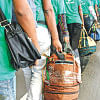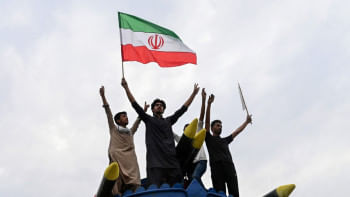Demand for Bangladeshi workers not high: Malaysian Minister

The demand for Bangladeshi workers is not as high as it used to be as some sectors have turned to other nationalities for their manpower needs, says Malaysian Human Resources Minister M Saravanan.
He said this before he flew to Bangladesh yesterday on a working visit.
He is scheduled to hold a final joint working committee meeting with Bangladeshi government on the recruitment of migrant workers.
Separately, he questioned the Bangladesh Association of International Recruiting Agencies (Baira)'s criticism of Malaysia's proposal to appoint only 25 Bangladesh Recruitment Agencies and 250 sub-agents.
"Baira should thank me that I increased it from 10 to 25," he said, asking why they were not making similar demands to Singapore.
He noted that the number of agencies involved was bigger previously and that there were a lot of problems, adding it was easier to regulate a smaller number.
"I think Baira is trying to take advantage," he said, adding that he would communicate his stance.
"I am not going to budge," he added.
Meanwhile, Baira called for the Malaysian government to allow all 1,530 of its members to send workers to Malaysia.
It claimed that Malaysia's proposal to appoint only 25 Bangladeshi agencies and 250 sub-agents had stalled the hiring process.
Baira's immediate past secretary-general Shameem Ahmed Chowdhury Noman said allowing only a select number of agencies to send workers to Malaysia would create a monopoly or recruitment syndicate, which will increase migration cost and various other irregularities, as seen previously under the old MoU, in which only 10 agencies were appointed.
This monopoly led to allegations of malpractice in the recruitment process including high costs faced by migrant workers to get jobs, leading the then Pakatan Harapan government to suspend the application for employment of Bangladesh foreign workers starting September 2018.
The international community had also deemed that those recruited from Bangladesh until 2018 were victims of forced labour, owing to debt bondage.
"This led to Malaysian companies paying back worker recruitment fees to ensure they could continue to export products to the United States," said Shameem, adding that Bangladeshi workers were provided a refund of about RM18,000 to RM20,000 per person.
"We have experienced this most recently in 2018, so how come the same people are proposing the controversial and irregular system again?
"Why are Bangladeshi workers not coming, it is because these people are trying to control the market through only 25 agencies," he said.
Shameem also said there was also no concern of Malaysia becoming a "dumping ground" for migrant workers, as what Saravanan had said previously.
Saravanan reportedly said in January that he only appointed 25 agencies and 250 sub-agents instead of the close to 1,600 agencies as Baira requested because he did not want Malaysia to be turned into a "dumping ground".
"The Malaysian government has the ultimate power to decide on the number of employment visas to issue.
"If the Malaysian authorities use the mechanisms that they have in place, how is it possible for us to turn Malaysia into a dumping ground?" Shameem asked.
He said Malaysia sourced workers from 13 countries, but the limit on recruitment agencies was only practised for Bangladesh.
"Why should there be a special system for Bangladesh?
"We can assure the Malaysian government that there will be no irregularities if it allows all the BRA equal opportunity to provide its services.
"This is because a strong monitoring system has been developed by both Malaysia and Bangladesh to ensure that the welfare of migrant workers are in place and recruitment agencies are following the laws," he said.
On 19 Dec, 2021, Saravanan and Imran signed an MoU on Bangladeshi workers recruitment. The five-year MoU involved the hiring of one million workers.
This new agreement lifted a freeze imposed since Sept 1, 2018, by the then Pakatan Harapan government, which suspended the application for employment of Bangladesh foreign workers due to allegations of malpractice in the recruitment process, including high costs faced by migrant workers to get jobs.
Copyright: The Star/ Asia News Network

 For all latest news, follow The Daily Star's Google News channel.
For all latest news, follow The Daily Star's Google News channel. 








Comments